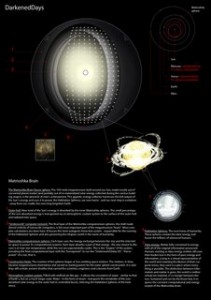Technological advance is often cited as evidence of man’s evolution. We can photograph deep space, tinker  with sub-atomic particles, and increase our lifespan. So with all our brainpower, we as a species can’t help but survive. Year Million runs, quite convincingly, with that premise.
with sub-atomic particles, and increase our lifespan. So with all our brainpower, we as a species can’t help but survive. Year Million runs, quite convincingly, with that premise.
The book is subtitled Science at the Far End of Knowledge and seeks to answer one simple question: What will the human race look like in the year million? Sure, it’s a lofty projection. But the author enlists a dozen-plus contributors — quantum physicists, computer programmers, geriatricians, futurists, etc. — to imagine the possibilities. At times, their extrapolations are mind-bending. But given the arc of our advances, and a slew of corroborating data, you can’t help but wonder if these nerds are onto something.
Much of the book springboards off the concept of technological singularity, that at some future point (probably by mid-21st century) machines will surpass human intellect, develop the ability to improve their own designs, and thus become self-perpetuating entities, independent of their own designers. It goes without saying, but when this happens, the world will change exponentially. Even now, computers are changing the way we think and interact. The internet links us in ways we could have never imagined just 50 years ago. Not only is information broadcast globally, in vast quantities, but communities of “persons,” connected electronically, have “tribalized” around shared data or desires. In this, the forecasts of the Year Million panel, though fantastic, remain feasible.
Along the way, the book touches upon “genomic nanomedicine” (the reshaping of our individual genetic blueprint), “brain prosthetics” (chips that can be inserted in the body to augment memory and/or  emotion), and “bemes” (a digital copy of an individual’s genetic code that can be transmitted and artificially rendered). One concept that gets a lot of space in the book is Matrioshka Brains, a massive, orbital computer fueled by the energy of a star wherein the knowledge of our entire planet can be uploaded. MBrains, as they’re called, can potentially become heavenly storage units for deconstructed, digitized, souls. See, I told you this was far out!
emotion), and “bemes” (a digital copy of an individual’s genetic code that can be transmitted and artificially rendered). One concept that gets a lot of space in the book is Matrioshka Brains, a massive, orbital computer fueled by the energy of a star wherein the knowledge of our entire planet can be uploaded. MBrains, as they’re called, can potentially become heavenly storage units for deconstructed, digitized, souls. See, I told you this was far out!
But as much as I enjoyed pondering the possibilities set forth in Year Million, I kept returning to one nagging question: Can Man ever really transcend his nature? For no matter how grand our technologies, human beings remain flawed. For instance, Steven B. Harris notes that our generation has gained 5 more I.Q. points than the previous generation. As our intelligence evolves, he conjectures, we will inevitably transcend our limitations. The problem is, despite the current advances of technology and the evolution of intelligence, the world still teeters on the brink of disollution. Economic collapse, terrorism, racism, genocide, starvation, crime, sex trafficking, and intercontinental ballistic missiles, make the Year Million look like a distant fantasy.
Apologist Ravi Zacharias uses the example of a petty thief who steals bits and pieces from train tracks. The judge believes that, if given the proper educational opportunities, the thief can be reformed. So he “sentences” the man to school. When the thief graduates, he no longer steals bits and pieces from train tracks — now he is smart enough to steal the entire train. As Zacharias notes, the problem is not Man’s head, but Man’s heart.
Chesterton suggested that original sin is the only verifiable Christian doctrine. We may not be able to categorically prove the existence of God or the innerancy of Scripture, but we can prove that human beings are sinners. Heck, all one needs to do is look in the mirror. While books like Year Million are fascinating, they suffer from one fatal miscalculation. It is this:
The heart is deceitful above all things, and desperately wicked: who can know it? (Jer. 17:9)
The real question is not what human beings will look like in the Year Million, but whether or not we can survive our own wickedness. Holding this grim view of Man may not be en vogue among the scientific elites, but it jives with reality. Because at the rate we’re going, our extinction is far more probable than bemes and brain prosthetics.















Great post, Mike. I love technology. I think we live in an exciting time. But the heart is no better than it has ever been and no technological advances will make it better.